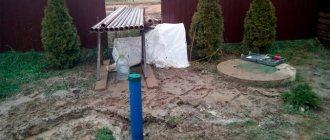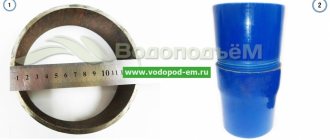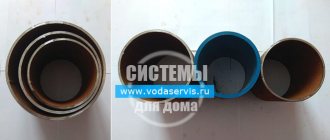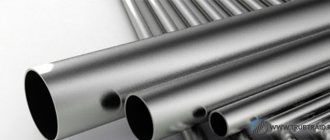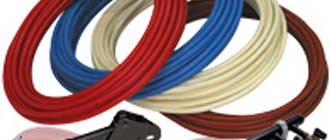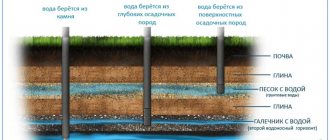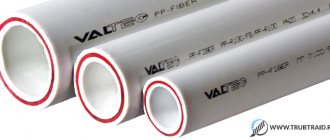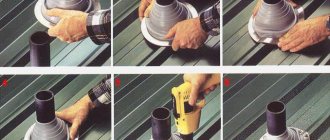The casing pipe is part of a hydraulic structure. It should be characterized by high strength, which will allow the well to be operated for a long period. When choosing such a product, special attention should be paid to the material. This is due to the fact that it will be difficult to replace the pipe in the future. When it deforms, the function of the facility’s water supply system is disrupted.
Types of casing pipes for wells.
Casing pipe: properties and purpose
A water well for a private house is a small-diameter vertical channel drilled in the ground using a special installation. Its depth often reaches several tens or even hundreds of meters. To prevent the destructive effects of natural factors on its walls and preserve the original quality of water extracted from deep layers, a special casing pipe is used for the well.
From the technical side, it performs the following number of functions:
- Prevents wall collapse and ensures the safety of water intake parameters throughout the entire period of operation.
- Eliminates the penetration of ground and surface flows into the watercourse due to the complete sealing of the tunnel.
- Prevents contamination and destruction of equipment from silt, soil particles, suspended particles, and aggressive substances.
- Maintains the original diameter of the well and protects it from ground displacements.
- Provides resistance to the pressure of soil masses.
Diagram of a well with casing Source housecomputer.ru
If drilling is carried out in hard rock or to a shallow depth with a guarantee of maintaining the original parameters of the channel, then a well without casing is allowed. However, most often a pipe string is still installed. Moreover, it can be either single or double.
In the first case, the casing simultaneously plays the role of both a protective contour and a working artery - through which water is directly drawn. The second option is when a separate pipe is installed inside the protective circuit. As a rule, such a need arises when quicksand is detected at the drilling site or there is a high probability of upper runoff entering the well, as well as wall collapse.
What is better: threaded connections or conventional welding?
Welded joints are used quite often in practice because they are cheaper. But they are not reliable, since during the welding process the metal is deformed, causing the column to deflect with each welded pipe. Also, the weld is the weakest point of the entire structure.
From the above it follows that in wells it is best to use drilling steel or plastic pipes with a threaded connection.
Creating water wells is a labor-intensive hydrological process that requires a lot of attention and the use of a variety of equipment.
This type of work is carried out only by qualified specialists who can ensure that the assigned tasks are completed accurately. The main difficulty is that the water lies at different depths, and certain forces must be applied to extract it. Drilling holes for water and organizing a well in accordance with all requirements takes from one to twelve days. It depends on the complexity and volume of work.
Selection rules
There are two types of criteria, consideration of which allows you to accurately decide which pipe is best to use for a water well, these are:
- Technical.
- Operational.
Factors of the first category include:
- Diameter.
- Method of connecting pipe sections.
- Type of material.
Choosing the diameter of the casing pipe Source ytimg.com
The diameter of the casing pipe for a well is calculated using a special formula, taking into account a number of parameters. It is generally accepted that along the internal contour its value should be at least 110 mm. This is due to two reasons - optimal water intake conditions and the selection of submersible pumping equipment of suitable dimensions.
The well will have better performance characteristics when the pipe segments are fastened with a threaded connection. It will ensure maximum tightness, strength and durability of the casing. In most cases, the installation company decides what diameter the installed pipe string should be and what type of connection is required for it in a particular case.
Factors of the operational category of criteria for choosing a pipe for casing:
- Inertness of the material relative to aggressive environments.
- Resistance to external compression of soil masses.
- Endurance relative to mechanical loads - to ensure integrity during transportation and installation.
- Increased resistance to corrosion.
- Long service life.
- Optimal cost.
Three modern materials meet the requirements: steel, plastic and asbestos cement.
Note! Which pipes are best to use for a water well must be decided in advance - before searching for an installer. Typically, a company works with only one material and has in its arsenal special equipment and proven technology for a specific type of pipe.
Casing pipe with thread Source vostokpipe.ru
See also: Catalog of companies that specialize in water supply, sewerage and related work
The use of metal and polyethylene pipes for creating wells
Now it is impossible to say that one or another material is definitely better or worse than another, so specialists do not replace them during work. Creating wells is a labor-intensive process that requires special attention to technical details. And specific types of pipes allow this to be done.
Metal casing pipes demonstrate excellent stability in floating and unstable soils. They are perfect for artesian wells, providing the necessary level of strength and reliability. In this case, pipe models with a thickness of 7 mm and a diameter of 127 mm are used.
Polyethylene pipes are traditionally considered a modern and innovative material, although they have appeared quite a long time ago.
They significantly simplify the tasks assigned and also reduce the costs of completing them. Such pipes are most often used to create casing strings in small (shallow) wells for domestic purposes. The water is pumped out using a centrifugal pump, and then enters the water supply system of the cottage or country house.
Any polyethylene materials have certain characteristics:
- High level of protection against corrosion; Reduced overall cost of a water well; Possibility to expand the diameter by increasing the strength characteristics of the pipe itself; Durability and reliability during long-term operation.
Metal pipes, despite their strength, have a number of disadvantages. The most significant of these is the effects of corrosion, subsidence and deformation over time. Polyethylene is a great opportunity to avoid this.
But we must never forget that only experienced and certified specialists should select materials and create wells!
Auger drilling as a popular technology in modern construction
Casing pipe - what is it?
This name is unfamiliar to a wide range of people. Of course, in order to go as deep as possible into this issue, you need to have special knowledge, which is given at least in a vocational school. However, an ordinary person does not need such detailed specifics, so we will limit ourselves to general concepts.
In this article we will deal with the following questions:
- Casing pipe - what is it? Where is it used? What is it used for? What types are there?
Types of pipe material
Those who first encountered such a water supply to their home from deep sources often have the question of which pipe is better for a well - steel or plastic. However, in reality, there is also a third option - asbestos-cement. Let us analyze the features of application, their positive and negative properties in more detail.
Steel
Steel alloy is the most common casing material. Most companies offer rolled steel pipes for casing formation. The main reason is that its service life is similar to the period of operation of the well itself. However, due to the wide variety of ferrous metal products, some companies offer an alternative.
Casing steel pipes Source geolog.ru
To the natural question of the average consumer, what kind of steel pipes are used for a well, the answer is the following number of options:
- Cast iron.
- Enameled.
- Galvanized.
- Stainless.
- Metal-plastic.
The advantages of steel pipes include:
- Resistance to damage during installation and transportation.
- Not subject to soil compression.
- More than half a century of service life.
- Possibility of clearing a channel when clogged with silt using drilling technologies.
- Preservation of original parameters until the end of operation.
- Maximum well depth.
Among their disadvantages are:
- Susceptibility to corrosion.
- Penetration of rust into the water supply.
- High price.
Alternative options do not have some disadvantages - for example, they do not rust. However, the natural price for this is a significant increase in the cost of the project.
Casing metal-plastic pipes Source remoskop.ru
Advantages and disadvantages of all types
The process of drilling with casing will be easy and correct if it is chosen correctly. Taking this into consideration, it is worth studying in more detail all the disadvantages and all the advantages, classifying the columns only by the material of manufacture.
So, steel pipes for wells certainly last a very long time.
In addition, they are able to withstand enormous weight, which means very high soil pressure. Conventional welding is used to join several columns together. Welding can be done independently, which in itself is a positive quality.
Among other things, such products have the following advantages:
- Resistance to movement of soil layers; High degree of strength.
Disadvantages include the oxidation process and the cost of products.
Asbestos cement casing pipes
Asbestos-cement products for wells have a very long service life, moderate cost and a high degree of corrosion resistance.
One of the disadvantages is that to install such a column you need a very large diameter well, since the walls are very thick. However, despite this, the walls still remain quite fragile. In addition, asbestos-cement products are strictly prohibited from being installed in areas with moving soils.
PVC products can serve for an extremely long time without losing their positive properties.
They do not rust and do not emit harmful substances. They have a relatively low cost and are very easy to use. The work is also made easier by the fact that, compared to the two materials described above, PVC is very light in weight.
The joining method is either welding or connection using special elements.
The only disadvantage is that they have less strength compared to steel casing pipes.
Advice! To construct a well with your own hands, it is best to use plastic pipes, since working with them is very simple, and their welding can be performed even by unqualified specialists.
Selection by diameter
The diameter of the casing pipe for a water well is the most important characteristic, without which the drilling procedure will not begin. Its value directly depends on water consumption at peak consumption - that is, when all possible consumers are involved in the facility:
- Kitchen faucet.
- Shower.
- Washing machine and dishwasher.
- Bathroom.
- Garden watering system, etc.
According to regulatory data, the minimum water supply from a domestic well is approximately 700 liters per hour. Further, if we assume that at peak load 5000 liters of water per hour are required, then in accordance with the manufacturers’ recommendations it is necessary to install pumping equipment with a working diameter of 10 cm.
To calculate the internal diameter of the casing pipe, it is necessary to add twice the distance from the casing walls to the working diameter of the pump. If we assume that it is equal to 5 mm (the diameter of the pump should be slightly less than the internal diameter of the casing), then it turns out = 100 + 5x2 = 110 mm. And this is only the internal value of the parameter. The outer diameter of the pipe for a water well will be obtained by adding to it twice the wall thickness of the pipe itself. If it is, for example, 6 mm, then it turns out = 110 + 6x2 = 122 mm. The hole of the channel being drilled is always slightly larger than the diameter of the casing.
Using threaded pipes
Metal casing pipe for wells is made of grade 20 steel.
Its thickness is about 5 mm. If we assume that the corrosion rate is 0.1 mm/year, then its service life is 50 years. At the same time, the pipes withstand any movement of the soil and do not clog the water with anything other than rust.
Many people believe that filtering rust that gets into the water as a result of the oxidation process is an expensive task. But this issue can be resolved by using household water filters or settling it, since rust does not dissolve in water.
The biggest harm from rusty water is the increased likelihood of pumping equipment failure. But this problem can also be solved. It is necessary to install a more technologically advanced pump.
Casing technology
Well casing is carried out using a drilling rig using the following technology:
- At the initial stage, a channel is drilled that is larger than the diameter required - to a depth of at least 5 meters.
- Next, a smaller drill is installed, and drilling continues until the aquifer is reached.
- When water appears in the tunnel, hermetically connected pipe segments are installed.
- Once the required depth is reached, the pumping equipment is immersed.
- The well is being adjusted and tested.
Important! The drilling procedure should proceed evenly, and the casing should descend unhindered. Otherwise, the well pipe will be subject to overstress during installation, which will subsequently lead to rupture of the material and clogging of the well.
Comparison table of casing methods
The table shows the characteristics of the products that Aqualux+ installs:
| Options | Casing design | ||
| Steel | Steel + uPVC | uPVC | |
| External diameter (mm) | 133 | 137/117 | 125 |
| Inner diameter (mm) | 129 | 110/103 | 113 |
| Wall thickness (mm) | 4 | 4/6 | 6 |
| Type of connection | threaded | threaded | threaded |
| Certificate | GOST 9940-81 | GOST 10705-80 | ISO 9001:2008, GOST R 51613-20000 |
| Guarantee period | 5 years | 5 years | 10 years |
| Installation price* (RUB) | 3200 | 3700 | 2800 |
The price of drilling depends on the region of the Moscow region. Aqualux+ has a separate price list for each district. The established tariffs are determined by the complexity of work in different areas. The cost of travel outside the Moscow region is calculated separately. To get an accurate estimate, leave a request on the website.
Briefly about the main thing
The casing pipe in a well performs the following number of tasks:
- Keeps walls from collapsing.
- Protects against external water flowing into the well.
- Prevents it from clogging.
- Protects the well from destruction and compression by soil masses.
When deciding which casing pipes are better for a well - plastic, asbestos-cement or steel, it is necessary to proceed from the drilling depth, operating conditions and cost of work. When choosing a casing pipe, you should take into account not only the type of material and its properties, but also the way its segments are connected and the diameter, calculated according to the peak flow rate of water consumption. The casing procedure is carried out by specialized companies using special equipment according to the developed technology plan.
Ratings 0
Double column: metal + uPVC
You don’t have to choose which is better, plastic or metal, but use both materials at once. In this option, a plastic contour with a smaller size is installed inside the steel contour. This scheme is rarely used in the Moscow region.
What tasks does each of the structural elements perform:
- The outer contour takes mechanical loads caused by soil movements.
- The inner circuit protects the outer from corrosion. It prevents liquid from touching the metal walls.
Steel is used to make the outer contour. The internal contour can be made of HDPE or uPVC. Aqualux+ engineers recommend uPVC plastic pipes because they are more hygienic.
Buden is interested: The cost of a meter of drilling with a steel pipe ⌀ 133 mm and uPVC ⌀ 113 mm.
Figure 3: Casing pipe steel ⌀ 133 mm and uPVC ⌀ 113 mm.
Column made of metal + uPVC: pros and cons
The combination of metal and plastic is an excellent option. This design realizes the advantages of the two options and mitigates their disadvantages. The metal contour enhances the strength of the structure. The plastic casing prevents the liquid from touching the metal, protecting it from corrosion.
Double well casing technology:
- Preparing a shaft size for external casing.
- Assembling the external structure with threaded locks.
- Immersion of the production pipe into the external circuit.
The disadvantage of double casing is the high installation cost. This scheme is not used when the budget is limited. Installing a double casing requires more time than installing a single pipe structure.
Disadvantages of HDPE plastic casing
HDPE can be made from recycled plastic. The raw materials for HDPE can be used syringes, canisters, and containers for chemicals. Plastic recycling methods do not completely eliminate toxic substances.
As an alternative, we recommend considering uPVC. uPVC pipe is made only from virgin plastic. Food-grade plastic is guaranteed to contain no toxic substances. The uPVC pipe maintains the purity of drinking water and does not harm the ecosystem of the site.
When installing a single HDPE pipe, it is important to correctly calculate the strength of the structure. If an error is made in the calculations, the structure may collapse from excess load. Then the pump will jam at depth and it will be impossible to remove it to the surface. Collapse often occurs 25 to 40 years after installation as the plastic accumulates fatigue.
Figure 6: do not use HDPE pipe for well casing!
uPVC is the best casing for wells
We advise owners of plots in the Moscow region to install uPVC. Most of our clients choose this design. uPVC casing is environmentally friendly, practical and durable. The installation reduces the drilling budget and extends the service life of the source.
Unplasticized polyvinyl chloride does not react with water and substances dissolved in it. The design, which is not subject to corrosion, does not affect the composition of the liquid. The uPVC pipe does not harm the ecosystem of the site. In terms of strength and reliability, it is not inferior to analogues made of metal.
Plastic products weigh less than metal ones. The low weight of the elements simplifies the assembly of the structure. The elements are connected to each other using threaded locks. The connections are completely sealed. The penetration of soil and perched water into the trunk is excluded.
uPVC pipes are widely used in the USA and the European Union. In many Western countries it is prohibited to install metal casing. The ban is due to the fact that metal corrosion harms the environment. There is no such ban in our country yet. But many home owners have already chosen environmentally friendly and safe options.
